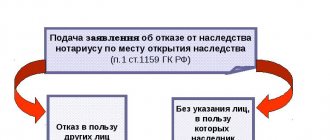Grounds for issuing a certificate of inheritance
Obtaining a certificate is necessary in most cases. A notary issues a certificate upon the application of a citizen who has entered into an inheritance upon payment of a state fee .
A certificate of the right to inheritance is a document certifying the heir’s right to the property mass or part thereof that was assigned by the testator after death. Although the legislation of the Russian Federation does not oblige the heir to receive such a document (part 2 of paragraph 1 of Article 1162 of the Civil Code of the Russian Federation), its receipt plays an important role in the further disposal of property. Thus, state registration of property (real estate) or registration (vehicles) is often necessary.
For your information
In order to obtain a certificate, it is necessary to submit a corresponding application to a notary. However, the notary will accept the application only if there are grounds for the citizen to enter into inheritance rights.
The application contains information:
- about the location of the notary’s office where the document is submitted and information about the notary himself;
- about the applicant (his last name, first name, patronymic, registration address, contact phone number);
- about the deceased citizen-testator (last name, first name, patronymic, residential address);
- about the applicant himself - the heir. Here it is also necessary to register passport details, residential address, in addition, indicate the nature of the relationship between the heir and the testator: it can be a family, marriage relationship, or a dependent person, etc.;
- about property that is part of the inheritance of a deceased person;
- date, signature of the applicant;
To obtain a certificate of the right to inheritance, in order to enter into inheritance rights by law , the following grounds :
- the absence of a testamentary document of the deceased on the disposal of his property in someone else’s favor;
- non-acceptance or refusal of the main heirs called to inherit property under the will;
- the heirs who are indicated in the testamentary document are removed from the estate or recognized by the judicial authority as unworthy;
- the heir has the necessary documents confirming inheritance rights to the property.
To obtain a certificate of inheritance, in order to accept property under a will, you must:
- presence of a will, certified by a notary and executed in accordance with Art. 1125 Civil Code of the Russian Federation;
- the presence of a closed will, formalized by protocol in accordance with Art. 1126 Civil Code of the Russian Federation;
- the presence of a will in a simple form, written under special circumstances and executed in accordance with the requirements of Art. 1129 of the Civil Code of the Russian Federation.
Attention
The grounds for inheritance are established by Art. 1111 of the Civil Code of the Russian Federation. Thus, entry into inheritance rights by law can only take place in the absence of a will, as well as in the presence of other circumstances established by law.
Certificate from a notary about the fact of opening an inheritance case
Applicants for inheritance must apply in person or through a representative. However, documents for registration of inheritance can be submitted via mail. But notaries recommend bringing them in person to avoid loss due to unforeseen circumstances.
Certificate of opening of an inheritance case.
When submitting documents by visiting a notary's office in person, their acceptance is certified by a notary's receipt. It confirms that the original documents were provided to the notary and he is responsible for their loss. After all, some documents may be useful in the future, after the completion of the inheritance.
All of the specified documentation, just like those compiled by the notary himself, are entered into the inheritance case and registered in the official register of the notary's office.
The following documents are drawn up by the notary:
- certificates, requests to various institutions;
- resolutions (for example, on opening a case of inheritance, on the appointment of a custodian, etc.);
- acts of division of shares;
- assessment acts;
- act on assignment of duty;
- certificate;
- other correspondence.
Copies of all these documents must be contained in the inheritance file. In the absence of one of them, interested parties can challenge one or another decision of the notary or even challenge the entire inheritance procedure as a whole.
Those documents, the originals of which, due to the impossibility of their withdrawal from circulation, cannot be placed in the file, are placed there in the form of copies certified by a notary. For example, applicants’ passports, death certificates, title documents, powers of attorney, etc.
In turn, upon completion of the inheritance case, when issuing the appropriate certificate, the notary returns the original documents that were seized during the case. The heirs give a special receipt stating that the documents were returned to them and a certificate was issued. The certificate itself is also registered in the official register of the Federal Property Management Agency.
The entire procedure and the actions of the notary regarding documents are regulated by Order of the Ministry of Justice of Russia dated April 16, 2014 N 78 “On approval of the Rules of notarial office work.” According to it, the seizure of original documents is allowed subject to the issuance of a receipt, including a copy of these documents, signed by a notary and the official stamp of the notary's office.
Place of issue of the certificate of inheritance
The document is issued in accordance with paragraph 1 of Art. 1162 of the Civil Code of the Russian Federation - at the place of opening of the inheritance case. In most cases, this place is the place of last stay or residence of the deceased citizen. The notary who opens the inheritance is determined under the totality of the following circumstances :
- place of residence or location of the deceased citizen in a certain area;
- the first letter in the surname of the deceased citizen;
- date of death of the testator.
Since the notary is determined at the initial stage of the case - at the opening of the inheritance, the heir receives a certificate of right to the inherited property from the same notary.
Deadline for issuing a certificate of inheritance
The certificate is issued to the heirs or successor within the time limits established by the legislation of the Russian Federation. So, according to paragraph 1 of Art. 1163 of the Civil Code of the Russian Federation, the document is issued after the expiration of the six-month period for entry into the inheritance mass, at any time (if there is an application for entry into the inheritance or the fact of its acceptance). But only if there are no obstacles to its issuance (for example, there is a dispute regarding this inheritance that is pending in court).
However, there are cases where a certificate may be issued before the expiration of such deadlines. The basis for this may be :
- the absence of persons other than the heirs who have already declared themselves;
- absence of litigation or other reasons;
- the presence of a court decision on early entry into inheritance rights.
Also, the legislation provides for cases when the issuance of a certificate may be suspended . Such situations arise under the following circumstances:
- the heir has not yet been born during the period provided for acceptance of the inheritance;
- there is a court decision to suspend the issuance of a certificate for any reason;
- there is legal proceedings regarding a dispute regarding this inheritance between the heirs and/or interested parties.
This list, defined in Art. 1163 of the Civil Code is exhaustive .
Important
If a notary refuses to issue a certificate within the time limits established by law without explaining the reasons, or such reasons are not grounds for refusal, as well as in other cases of refusal, the heirs can appeal the notary’s refusal in court. Having previously received a written document (refusal) from a notary.
All rules on the timing of issuing certificates are contained in the Civil Code and in the fundamentals of the legislation of the Russian Federation on notaries.
Inheritance of marital property
Property acquired during an official marriage is distributed equally between the spouses. After the death of the husband (wife), half of the property goes to the surviving spouse. The notary issues a certificate of the right to inheritance when a corresponding written application is received from the new owner. Applicants for the remaining half of the property are notified of the issuance of a certificate without fail.
The property of the deceased spouse is subject to distribution among relatives who have expressed a desire to receive their share within six months. The surviving spouse also has every reason to participate in the process by submitting an application to a notary. The certificate of inheritance, which is issued to other applicants, must contain a reference to the fact that half of the total property went to the surviving spouse.
The procedure for issuing a certificate of the right to inheritance by law and by will
Legislation and regulations regulate the fact that a certificate of the right to inheritance can be issued only at the request of the heirs or heir.
When issuing a certificate, the notary performs certain actions. When inheriting by law, a notary carries out:
- checking the fact of the death of the testator;
- establishing the place and time of opening of the inheritance property;
- identification of persons who are heirs;
- verification of the grounds for recognition as heirs of persons who filed an application;
- checking the composition of the property and its location;
- verification and establishment of other facts.
To do this, the notary requests the necessary documents by sending appropriate requests to authorities, banks, government bodies and institutions, as well as other organizations.
After collecting the appropriate evidence and checking the facts, the notary sends notices of the opening of the inheritance to all available heirs of the first priority.
When inheriting by will , the notary performs the following actions:
- checking the fact of the death of the testator;
- establishing the place and time of opening of the inheritance property;
- checking the existence of a will;
- identification of citizens who have a legal right to an obligatory share in property.
Afterwards, the notary notifies the heirs by sending a written notice to their addresses.
For your information
In cases where there are several wills, only the one written last will be valid.
To obtain a certificate, the heirs submit the following documents :
- a document that confirms the death of the testator, which includes the time of death;
- grounds for inheritance (documents certifying family relationships or a will);
- title or other documents that can confirm the rights of the deceased to his property;
- valuation of inherited property;
- documents proving the identity of the heir;
- application for entry into inheritance rights.
There are situations when the deadline for the heir to enter into inheritance is missed . In this case, some options for acquiring an inheritance :
- restore the deadline that the late heir missed;
- recognize rights to inherited property in court;
- recognize an heir who has entered into an inheritance by other heirs. This action is also performed by submitting an application to a notary (Articles 1154, 1155 of the Civil Code of the Russian Federation; clauses 42 - 44 of the Methodological Recommendations dated 02/28/2006).
Example
Citizen Petrov A.I. filed a lawsuit to restore the missed deadline for accepting the inheritance. He presented irrefutable evidence to the court that within 7 months after the death of the testator, he was undergoing rehabilitation after an accident in a medical institution. In this case, the reason is valid; accordingly, the court will satisfy the claim of citizen A.I. Petrov (clause 1, article 1155 of the Civil Code of the Russian Federation).
List of documents for opening an inheritance case
Conditionally necessary documents for registration of inheritance can be divided into two classes. Thus, there is a class of documents the provision of which is mandatory in all cases. Without them, succession will not take place. A different class of documents may be required depending on the specifics of each specific case.
Thus, the list of mandatory documentation includes:
- a certificate from the civil liberties body confirming the fact that the testator actually died due to medical conditions or as a result of a court decision;
- a certificate from the passport office or a certificate from a housing organization stating that the testator recently lived at one or another address, corresponding to the area where the application for acceptance of the inheritance is sent, immediately before his death;
- documentation indicating the right of the testator to dispose of this or that property in any way, confirming that the testator has this or that property;
- testamentary document (as a rule, information about such a document is already contained in the notary’s office, but it is mandatory to provide it if available);
- if there is no will, then the legal claimant to the inheritance must confirm the fact that he belongs to one or another line of inheritance involved in the succession by any document.
As already mentioned, this is only a minimum list of documents. In each case, you should consult with a notary or lawyer to find out what other documents may be needed. The help of professionals is never superfluous.
Was the Recording helpful? No 45 out of 71 readers found this post helpful.
Notary fee (cost) for issuing a certificate
When receiving a certificate of inheritance, you must pay a state fee. Depending on the degree of relationship, the size of the tariff established by Art. 333.24 of the Tax Code of the Russian Federation:
- for heirs of the first and second priority (except for grandparents) - 0.3% of the value of the inherited property in the part that is due to this heir. The limitation on the maximum amount of state duty in this case is 100,000 rubles;
- for other heirs - 0.6% of the value of the inherited property in the part that is due to this heir. The limit on the maximum amount of state duty in this case is 1,000,000 rubles.
In cases where the value of the property is unknown, it can be determined by specialized organizations .
Payment for carrying out activities to evaluate the inherited property is carried out at the expense of the heirs or one of them, by agreement. In extreme cases, such issues can be resolved by a judicial authority. And in some (exceptional) cases, payment for assessment activities is made from the funds of the inherited property.
The legislation establishes (clause 1 of Article 333.25 of the Tax Code of the Russian Federation) that the assessment must be carried out at the time of opening of the inherited property.
However, property does not always need to be valued. The Tax Code of the Russian Federation stipulates that the state fee should be calculated when issuing a certificate of title to inherited property based on the following options for the value of such property:
- inventory value;
- cadastral value;
- market value;
- nominal value.
In this case, the notary is not authorized to demand a document confirming a particular value of the property. If there are several documents that confirm the value of the property and this value differs, in this case the calculation can be made from the lowest value of the property.
Information
In accordance with Art. 333.38 of the Tax Code of the Russian Federation, there is a category of persons and types of property, upon inheritance of which citizens entering into inheritance rights are exempt from paying the fee or do not pay it in full upon receipt of the certificate.
Such benefits arise in the following cases:
- upon entry into the inheritance rights of citizens with disabilities of the first and second groups, payment of the state duty is carried out in the amount of 50% of the amount of such duty;
- upon entry into the inheritance rights of citizens living together with the testator and inheriting after his death, this residential building and the plot on which this house is located;
- when inheriting deposits, wages, insurance amounts, royalties;
- when inheriting property, if the testator died while performing duties or tasks in connection with his official position, etc. ;
- if the heirs are minors, minors and incapacitated citizens;
- other persons established by law.
In addition to paying the state fee, the notary is usually paid for his technical or legal work . Tariffs for such work are not clearly regulated by law and can be set by notary offices independently.
It should be noted that the notary has no right to charge fees for such services or impose services on citizens. Such services can be provided by a notary only with the consent of the citizens themselves.
To resolve disputes regarding the calculation and application of state duty calculations by notaries, citizens have the right to apply to the courts to protect their rights and legitimate interests.
Example
Citizen “P” applied to the district court to establish the cadastral value of a residential property in an amount equal to its market value. In substantiating her claims, citizen “P” indicated that she is the heir to this property. When paying the state fee for issuing a certificate of inheritance, the notary calculated the tariff based on the cadastral value of the property. However, the plaintiff does not agree with this cost, since she believes that the cost is too high. In order to confirm her arguments, citizen “P” turned to independent experts to conduct an independent examination of the market value of home ownership. Experts have calculated the market value, which is 200,000 (two hundred thousand) rubles less than the cadastral value.
The applicant asks the court to establish the cadastral value of the home ownership equal to the market value determined by experts.
Having studied the case materials, heard the parties, and analyzed the current legislation, the court came to the conclusion that the stated requirements were satisfied for the following reasons:
- establishing the market value of an object is a legal way to clarify the cadastral value of an object;
- the assessment was carried out by specialists legally and in accordance with the requirements of laws and regulations;
- the inflated cadastral value of home ownership entails the burden of mandatory payments, the amount of which depends on the cadastral value of the property.





